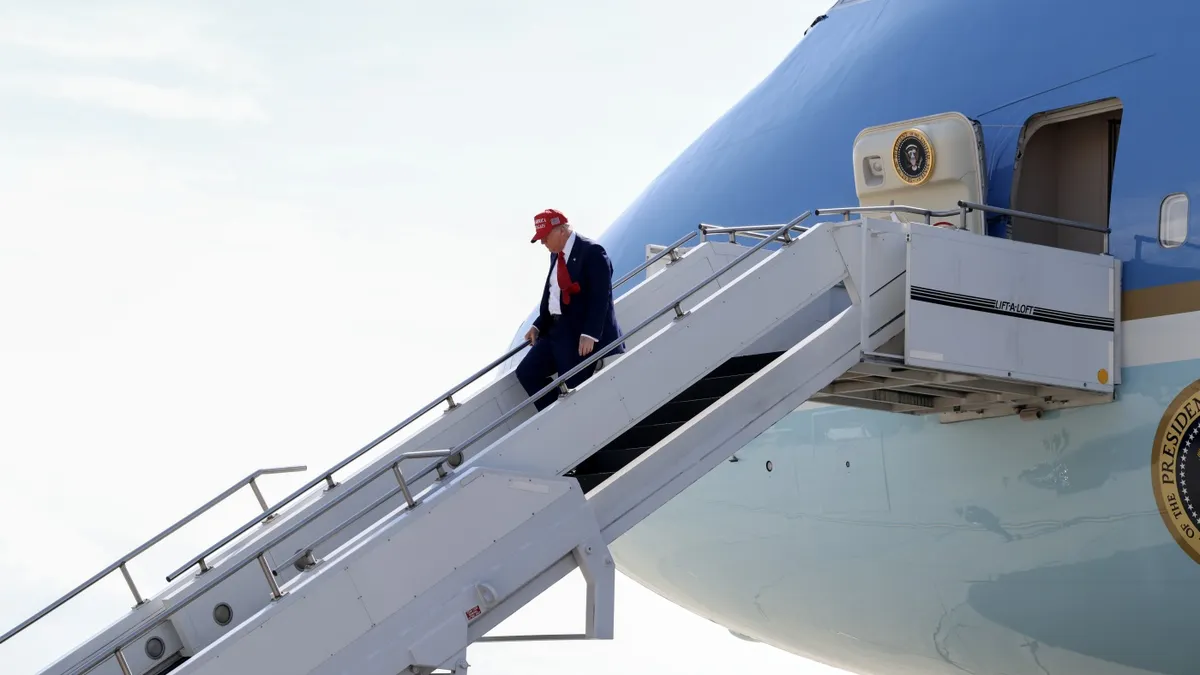
The Trump administration's proposal to accept a luxury aircraft from the Qatari government to potentially serve as Air Force One has sparked intense backlash from Democratic lawmakers and independent watchdog organizations. Critics argue that this move could violate the U.S. Constitution, particularly the Foreign Emoluments Clause, which prohibits public office holders from accepting gifts from foreign entities.
On Sunday, the White House confirmed that Qatar had offered to donate a plane to the Department of Defense. However, it was clarified that this proposal would not be finalized or accepted during President Trump’s upcoming visit to the Middle East. Frustration over the long-delayed delivery of two upgraded Air Force One jets from Boeing, stemming from a 2018 contract, has led Trump to consider the Qatari offer. In a statement to reporters, he remarked, “I mean, I could be a stupid person and say, 'No, we don't want a free, very expensive airplane,'” indicating that he viewed the offer as a generous gesture.
The aircraft in question, a Boeing 747, is estimated by industry experts to be worth around $400 million. This potential acceptance of such a significant gift raises serious legal questions, as it would mark one of the largest foreign gifts ever received by the U.S. government. According to the Foreign Emoluments Clause, public officials are barred from accepting any type of gift from foreign kings, princes, or states.
President Trump defended the offer, stating that the plane was not a gift to him personally but rather intended for the Department of Defense. He further claimed that the aircraft would be decommissioned after his term and used for his presidential library. However, experts like Richard Briffault, a professor at Columbia Law School specializing in government ethics, argue that this distinction is inconsequential. Briffault asserts that if the plane eventually ends up at Trump's library, it cannot be considered a gift to the U.S. government at all, thus violating the Emoluments Clause.
Briffault expresses concern that accepting the aircraft could create a sense of obligation toward the Qatari government, potentially influencing U.S. public policy on matters such as weapons deals. He notes that gifts are often intended to foster goodwill and encourage reciprocal actions, which raises questions about Trump's motivations in this context. Jordan Libowitz, vice president of communications for the nonprofit watchdog Citizens for Responsibility and Ethics in Washington (CREW), echoed these sentiments, highlighting Trump's ongoing business interests in the Gulf, particularly in Qatar.
Libowitz pointed out that the Trump Organization, which Trump transferred control of to his sons in 2017, did not commit to avoiding foreign business dealings during his second term, unlike his first. This raises further ethical questions, particularly in light of a recent deal announced in April to build a luxury golf resort in Qatar.
Experts emphasize that the scale of this proposed gift is unprecedented. Traditionally, gifts received by presidents are modest—think cufflinks or bottles of wine—and must either be turned over to the U.S. government or purchased at fair market value. Libowitz remarked, “We have never seen something on this level before,” especially considering Trump's personal business interests in Qatar, which adds significant concern.
During his first term, CREW even filed a lawsuit against Trump, alleging that he was receiving illegal benefits and favors from foreign governments through his hotels and real estate dealings. Although the case reached the Supreme Court, it was dismissed as moot after Trump left office in January 2021.
In response to the proposed aircraft transaction, various prominent Democrats have expressed their disapproval. Senate Minority Leader Chuck Schumer criticized the plan as "premium foreign influence with extra legroom." Representative Ritchie Torres of New York has gone so far as to request an immediate review by the U.S. Government Accountability Office and the Office of Government Ethics, describing the situation as a “flying grift.”
Torres is advocating for a formal advisory opinion to determine if accepting the plane violates federal ethics regulations. However, experts caution that there may be no existing authority capable of stopping the transaction from proceeding. Representative Jamie Raskin, a former constitutional law professor, stated that Trump must seek Congressional consent to accept the gift, referencing the Foreign Emoluments Clause. Yet, Briffault believes that the only recourse Congress might have would be impeachment, a scenario that seems unlikely given the current Republican majority.
Ali Al-Ansari, Qatar's media attaché to the U.S., indicated that the potential transfer of the aircraft from Qatar's Ministry of Defense to the U.S. Department of Defense is still under legal review. As details about the proposed transaction remain sparse—such as the timeline for the aircraft’s readiness and whether it will undergo thorough scrutiny for safety and security—Libowitz noted that this process could take years, potentially outlasting Trump’s presidency.
Trump has claimed that his acceptance of the aircraft would mirror former President Ronald Reagan’s decommissioned Air Force One, which is displayed at his presidential library in California. With ongoing discussions and political ramifications, the implications of this potential acceptance of a foreign gift continue to unfold, raising critical questions about ethics, influence, and the intersection of business and government.